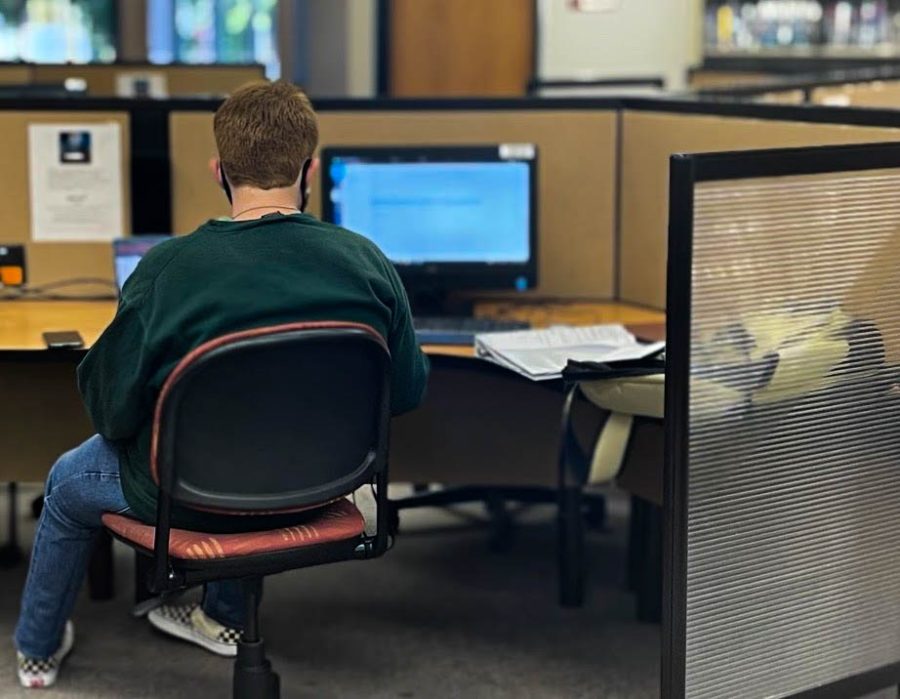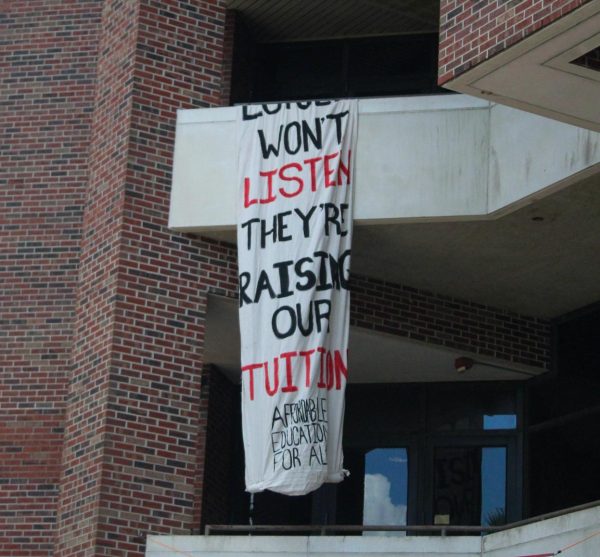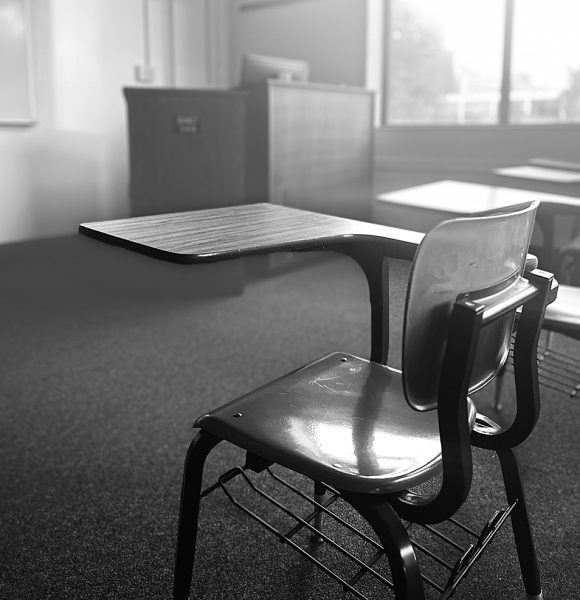Students and professors struggle to find online library resources
A student does schoolwork on a library computer and a personal laptop in the Monroe Library in New Orleans on Thursday, Nov. 11, 2021. Some students are having trouble accessing resources through the library.
Environmental studies senior Vairleene Einstein conducted research on green infrastructure during her summer internship this year. She found a resource to support her findings but couldn’t access the article immediately through Loyola’s library.
“I was really mad because it was the perfect article for my research,” Einstein said.
Students like Einstein and Loyola professors are having difficulties with accessing online journals and articles needed for research through the J. Edgar & Louise S. Monroe Library. Library officials say that using the interlibrary loan service would alleviate these problems.
Paul Barnes, professor of biology, said that his students are restricted to minimal resources.
“They’re pretty much limited to open access journals or those few journals that our university library has,” he said.
Open access journals are sources like books, journals, and articles that are available to the public for free.
Not only is he looking for sources for his students, but Barnes said he needs access to a large body of journal articles and book chapters from the library to do his research as a member of a United Nations panel covering climate change. He said that Loyola has few of the journals he needs.
He often asks colleagues at other universities to send him copies of articles and journals, as does Einstein.
“We shouldn’t have to rely on friends or any colleagues from another institution to get access to these materials,” Einstein said.
If Barnes can’t find what he needs at Loyola, he digs online for other places offering the paper or visits a different university library altogether and requests access to its resources. He said this isn’t efficient enough for him, and it takes too long for Loyola to provide him with what he needs.
“I can’t really wait around for the library to process some sort of a request and send me a photocopy or something like that,” he said.
Joel MacClellan, philosophy professor, agreed that the wait time for resources is too long. He said that he thinks his students feel the most pressure.
“I think from a student perspective, it’s problematic mostly because students tend to be working with fairly narrow time frames,” he said.
Due to limited time, students and faculty like to have resources made available to them immediately, according to MacClellan.
“We are now in a time where we’re used to instant access via the Internet,” MacClellan said. “It’s definitely a disconnect between being able to get that information right now and continuing your train of research with, ‘Maybe I’ll get that at some later time.’”
MacClellan said that he pivots to other articles rather than requesting them through interlibrary loan services. Due to this, he said the library may not know the degree to which this is a problem.
He was correct according to Interim Dean of Libraries Laurie Phillips.
Phillips said that due to a lack of interlibrary loan requests, the library doesn’t have the information needed to know that students and professors are struggling to access certain online resources. The interlibrary loan service allows for students and faculty to request to borrow resources from another library that owns them.
“If they never ask for it, then how do we know what they need?” Phillips said.
Interlibrary loan is often considered to take too long, with wait times taking up to several weeks, according to MacClellan. However, Phillips said the turnaround time is fast for articles if they are from mainstream sources and are owned by many universities.
Through personal experience, Phillips has received articles through the interlibrary loan service in as little as a day or two after putting in a request. She encouraged professors and students to give it a try.
Jessica Perry, the library’s interlibrary loan and distance library specialist and e-reserves manager, said that the average turnaround time for physical books and other hard copy materials is 19 days, and electronic resources have an average turnaround time of four days.
She suggested that students and professors go to Tulane University in person to look for information first before opting for interlibrary loans, as utilizing Tulane’s resources is quicker because of Tulane’s proximity to Loyola.
Barnes said he wishes Tulane’s electronic resources were more accessible since students and faculty must be on Tulane’s campus and use its library’s computers to access the university’s articles and journals online. Library licenses for online resources don’t allow for off-campus use by people outside of the university’s own community, according to Phillips.
“That would make my life a lot easier, and it would just open up a window for a lot of information that our students right now don’t have access to,” Barnes said.
Phillips’ recommendations for students and faculty who are struggling with finding resources are to use interlibrary loan to find the resource elsewhere or work with a librarian to look for what they need.
“Every department has a liaison. They could make an appointment with the liaison librarian and say, ‘I need help! Everything I’m trying to use is not available,’” Phillips said. If a student makes an appointment, they can discuss what materials the library has access to that may be a good substitute. If they discover that resources aren’t available, this provides the library with the information needed to purchase new materials, according to Phillips.
Librarians and liaisons like Phillips are eager to help students and professors find what they are looking for, but MacClellan said more resources are desired.
“It’s a great space, (and) the faculty are really helpful, but in terms of raw access to information, which is what a library is, it needs some catching up there,” MacClellan said.

Arianna Blakely is a senior from Boston studying journalism with a minor in psychology and is working as a copy editor this semester at The Maroon. She...





